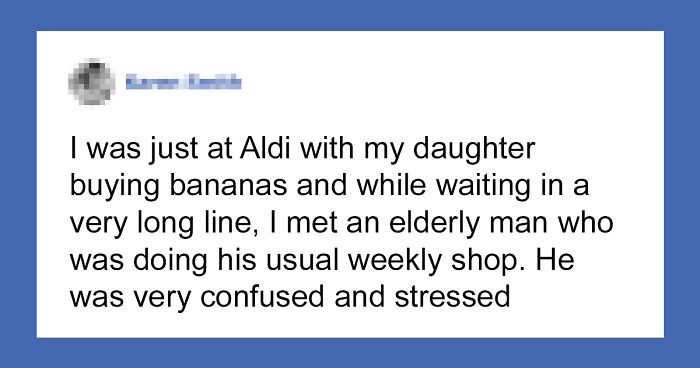
Woman Takes To Facebook To Inspire Some Common Sense Among COVID-19 Outbreak Hoarders
Interview With ExpertHoarding. That’s a word we used to mostly associate with dragons who protect the treasure in their caves. The coronavirus health crisis has shown that some of us have a small dragon inside of us. A dragon that likes stockpiling and hoarding products because we fear our lives may be in danger.
From toilet paper and hand sanitizer to food with a long shelf life, some people are buying up massive amounts of things and leaving very little for everyone else who might actually need these things. Twitter user NatFigBar shared a post she saw on Facebook about how we should all avoid our instinct to stockpile things because everyone else is doing this. Because this hurts others more than it helps us.
While some people supported NatFigBar’s message that we should all calm down, others responded that this is a question of survival and that they and their families come first.
Twitter user NatFigBar shared a Facebook post about stockpiling chaos during the coronavirus crisis
Image credits: NatFigBar
Image credits: NatFigBar
What we’re seeing now is a battle between social responsibility and survival, public and personal interests. At the end of the day, it’s up to all of us to come together to get over the crisis, not fragment into tiny competing factions.
Bored Panda reached out to David Savage, associate professor of behavioral and microeconomics at the University of Newcastle in Australia, about stockpiling supplies and panic buying. However, Dr. Savage stated that what we’re seeing now can’t technically be called “panic” because the coronavirus situation doesn’t meet the scientific criteria for that term.
“What I think is actually occurring is not panic, but we are succumbing to several other behavioral issues, specifically herd behavior and loss aversion (regret),” he said.
“When we see others acting in a certain way we have historical makeup that wants us to conform with the group… i.e. we should also do the same. Or at the very least we stop and think about the behavior and wonder if we should also be doing that. This is also ingrained in us through social norms where we are supposed to act in a specific way in certain circumstances (think women and children first).”
“It is not rational to buy 500 cans of baked beans for what would likely be a two-week isolation period”
Dr. Savage continued: “The other issue is the loss aversion, this is caused because we experience losses much more keenly than gains. Losing $100 feels worse than winning $100 (research shows it is actually about double, i.e. losing $100 feels like losing $200). So when we see shelves being cleared out we want to make sure that we don’t miss out, the other problem here is regret, if we later realize that we needed the toilet paper and we didn’t get it when we had the chance we will really feel bad.”
“Both of these can lead to overstocking rather than under, and game theory tells us that if we know that the shelves will be empty when the pandemic is officially called we want to get in a little early. But, so does everyone else… so we get in even earlier… then so does everyone else… This is called backward induction. Eventually, people would act immediately rather than risk others getting in before them.”
Dr. Savage pointed out that the decisions we make under uncertainty are more “volatile” than those we make in a rational (“cold”) state. “It is rational to prepare for something bad that looks like it is likely to occur, it is not rational to buy 500 cans of baked beans for what would likely be a two-week isolation period.”
There’s a difference between disaster preparation and panic buying
Meanwhile, Steven Taylor, a professor and clinical psychologist at the University of British Columbia who wrote The Psychology of Pandemics, warned that irrational stockpiling can lead to price gouging and scalping.
“If the price of a roll of toilet paper is tripled, that’s seen as a scarcer commodity to acquire, which can lead to anxiety,” he pointed out.
Tailor also explained that we have to make a distinction between disaster preparation and panic buying. The former is rational and useful. The latter is irrational and fueled by anxiety. We try to reduce that anxiety by buying more than we need and queueing for hours on end.
“Under circumstances like these, people feel the need to do something that’s proportionate to what they perceive is the level of the crisis. We know that washing your hands and practicing coughing hygiene is all you need to do at this point,” Taylor said.
“But for many people, hand-washing seems to be too ordinary. This is a dramatic event, therefore a dramatic response is required, so that leads to people throwing money at things in hopes of protecting themselves.”
Some people agreed that hoarding supplies is the wrong way to go about things
Image credits: SJimons
Image credits: twitter.com
Image credits: LaurenzSide
Image credits: SeremaStorm
Meanwhile, others explained that they see the situation as a question of survival
Image credits: AndyMbbsc
Image credits: AndyMbbsc
NatFigBar reiterated that this is no time for selfishness
Image credits: NatFigBar
Here’s what some other people thought
Image credits: i_mehaff
Image credits: youthmrwhite
Image credits: DeeJayDragon
Image credits: sam_j81
Image credits: JohnPearce984
Image credits: Porkcutletbowlx
Image credits: clareking1977
Internet users debated the pros and cons of stockpiling goods
Your kid is not hanging off of a cliff next to another kid and a pregnant woman. That's not what's happening, in fact, that will never happen.
I shop every week and even if I haven’t used my supply I still by my staples , like the pack of toilet paper, a package of wet wipes, hand sanitizer, shampoo , laundry soap. I never go buy out the store. So every month I’ll buy a 30 roll pack of toilet paper I’m glad I do because otherwise I wouldn’t be able to get any. We have 6 teenagers in our household. And yet I told a neighbor if they needed wipes because people are hoarding I have some they can have. To me it is money already spent and gone. I have neighbors with young children that can’t get ahold of what they need because people are hoarding. If you are sick don’t go out, if your kids are sick keep them home then we wouldn’t have epidemics and pandemics. Be human and how God wants us to be loving , help each other
I'm so glad to hear someone mention God and how he expects us to treat each other! I feel like I should be hearing that a whole lot more than I have. Especially from our "leaders"
Load More Replies...People raced to store to buy extra toilet paper before every storm when i lived in Virginia. I still dont understand why, there were other items purchased but toilet paper made the least sense. We always have at least a month worth of toilet paper in the house, regardless of the weather.
Like bread and milk disappearing from grocery shelves before a snowstorm.
Load More Replies...Your kid is not hanging off of a cliff next to another kid and a pregnant woman. That's not what's happening, in fact, that will never happen.
I shop every week and even if I haven’t used my supply I still by my staples , like the pack of toilet paper, a package of wet wipes, hand sanitizer, shampoo , laundry soap. I never go buy out the store. So every month I’ll buy a 30 roll pack of toilet paper I’m glad I do because otherwise I wouldn’t be able to get any. We have 6 teenagers in our household. And yet I told a neighbor if they needed wipes because people are hoarding I have some they can have. To me it is money already spent and gone. I have neighbors with young children that can’t get ahold of what they need because people are hoarding. If you are sick don’t go out, if your kids are sick keep them home then we wouldn’t have epidemics and pandemics. Be human and how God wants us to be loving , help each other
I'm so glad to hear someone mention God and how he expects us to treat each other! I feel like I should be hearing that a whole lot more than I have. Especially from our "leaders"
Load More Replies...People raced to store to buy extra toilet paper before every storm when i lived in Virginia. I still dont understand why, there were other items purchased but toilet paper made the least sense. We always have at least a month worth of toilet paper in the house, regardless of the weather.
Like bread and milk disappearing from grocery shelves before a snowstorm.
Load More Replies...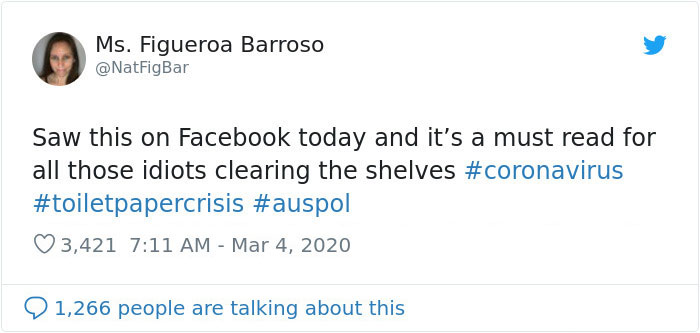
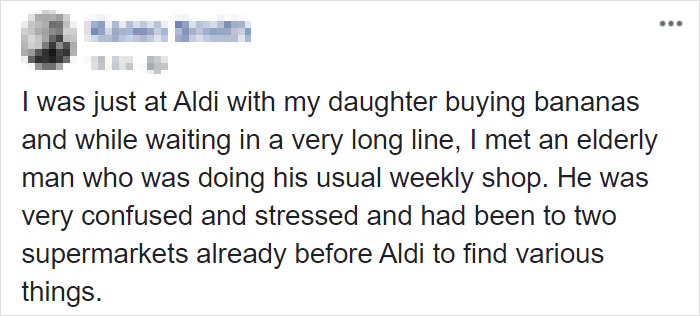



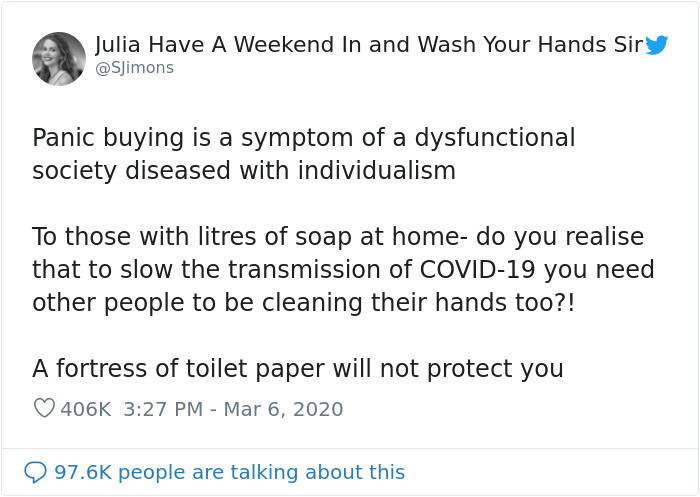
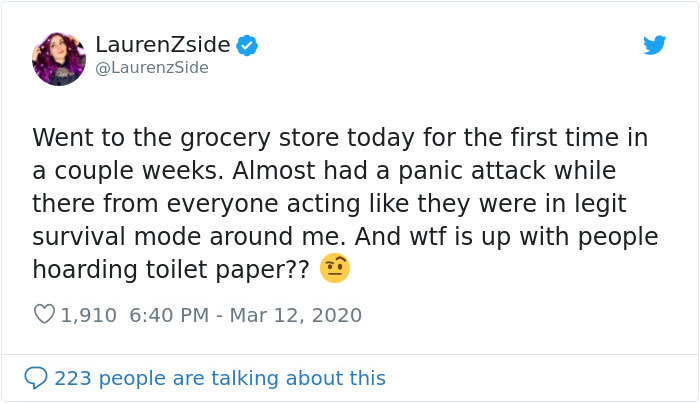
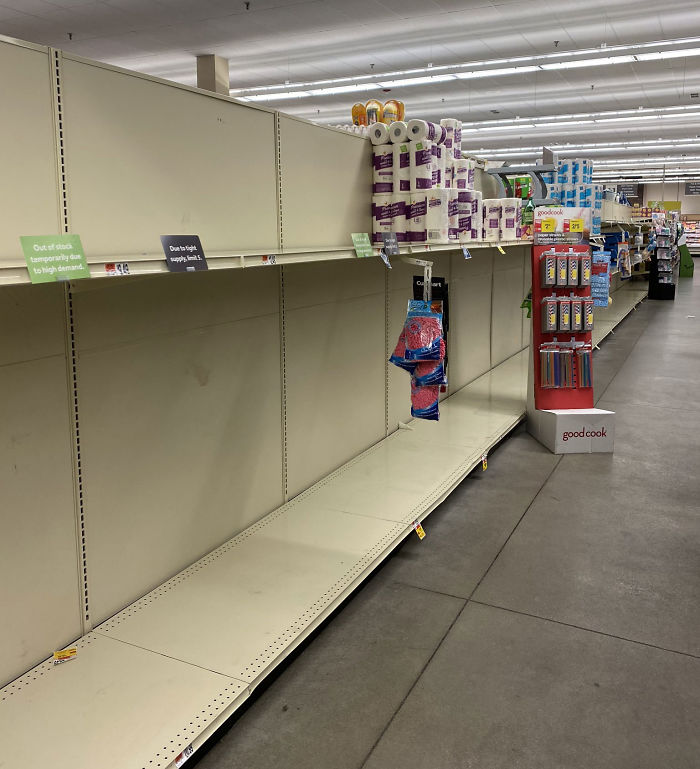

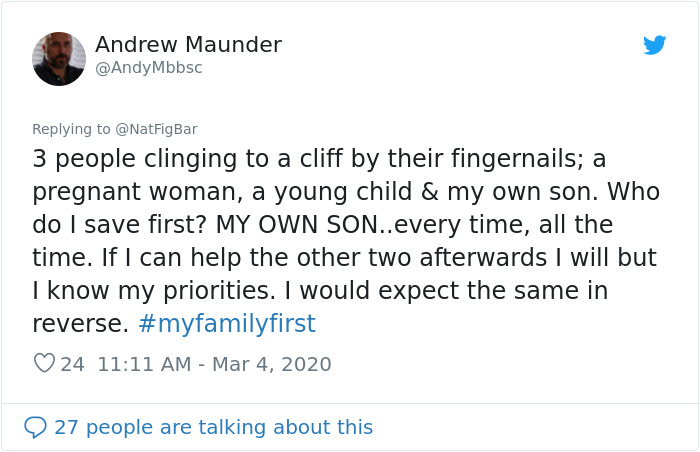
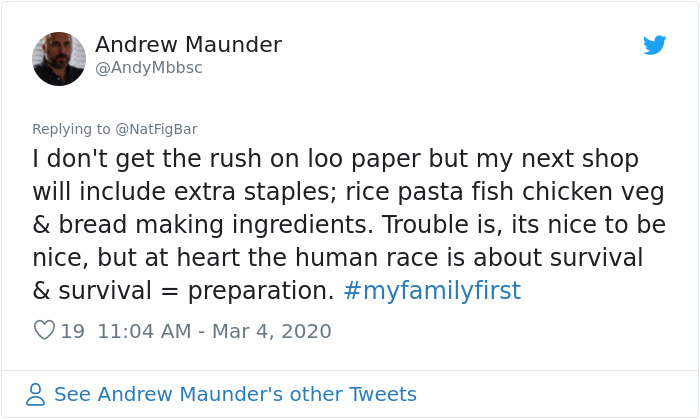
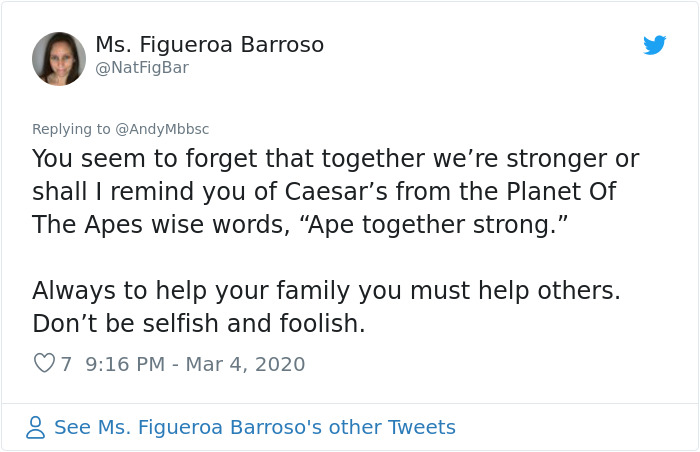

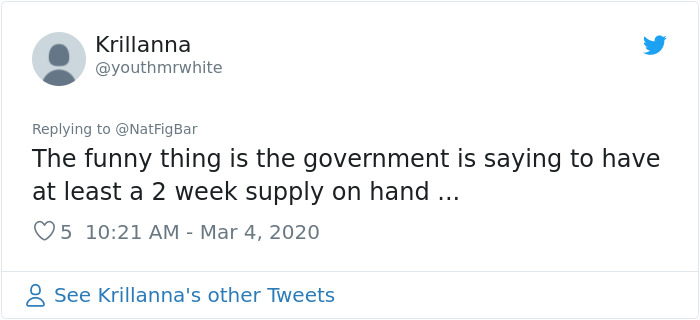
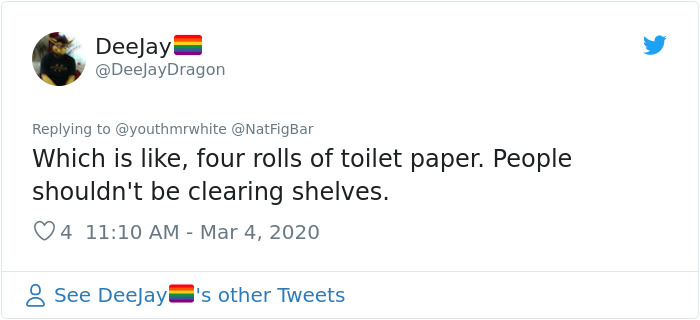
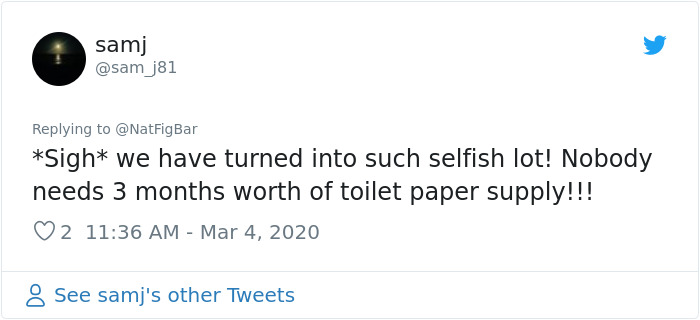
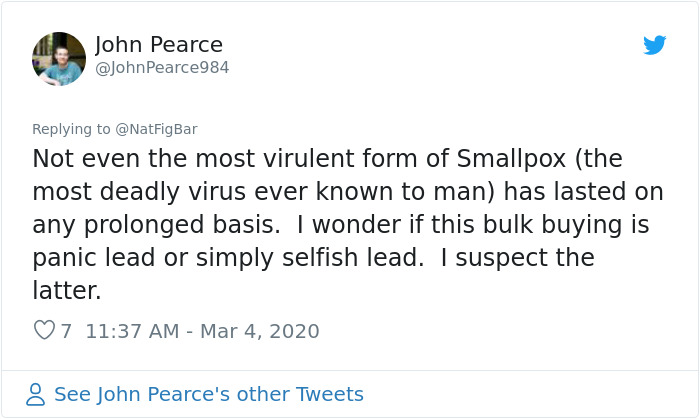
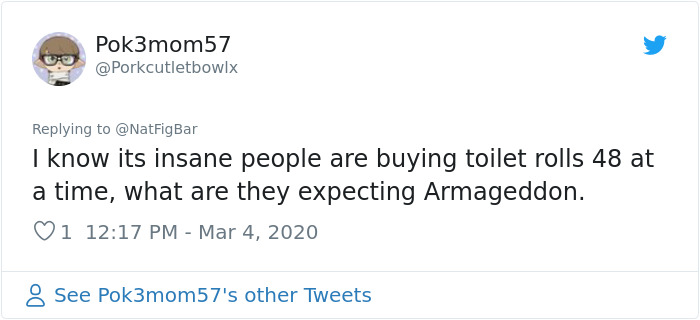

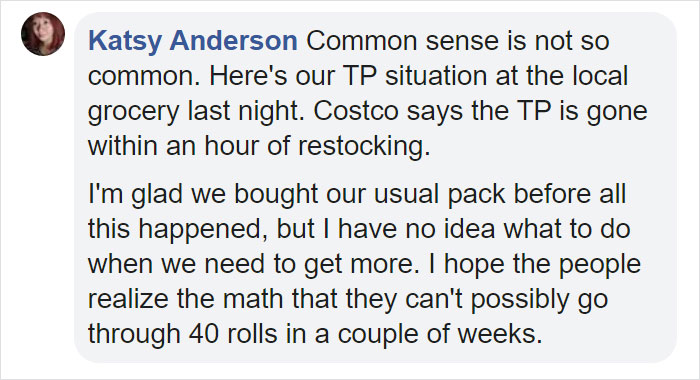
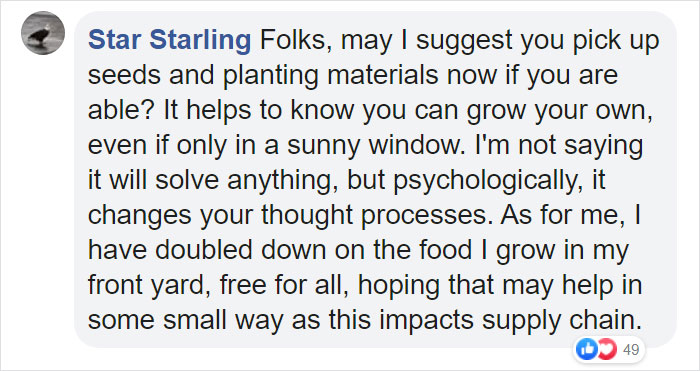

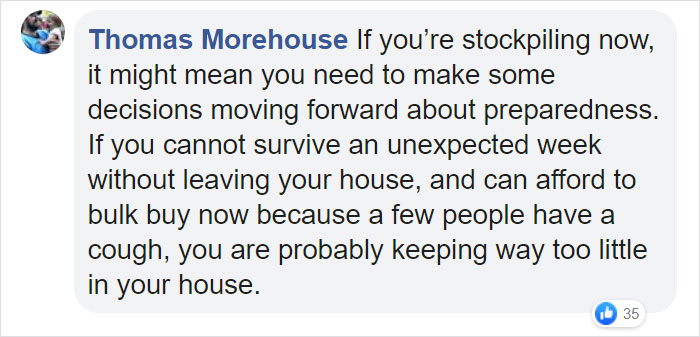



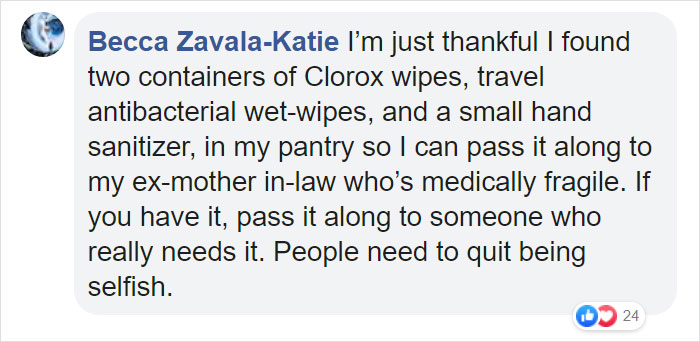
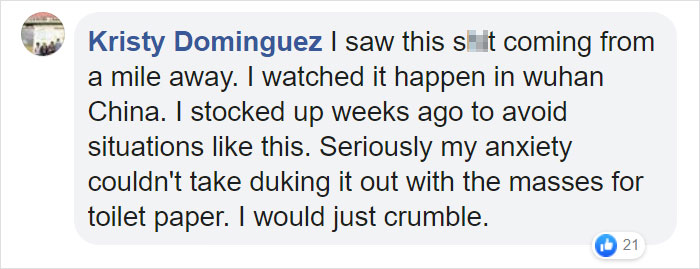
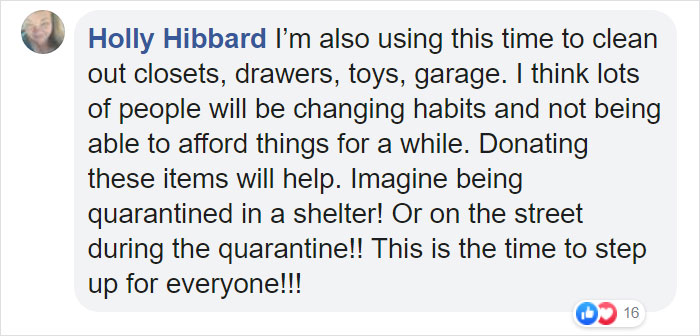





46
24